- Home
- Marie Ferrarella
Dr. Forget-Me-Not (Matchmaking Mamas) Page 3
Dr. Forget-Me-Not (Matchmaking Mamas) Read online
Page 3
And that was where his mother had finally gotten him. On the doctor front. She had, quite artfully, pointed out that because of new guidelines and the changing medical field, getting doctors to volunteer their services and their time was becoming more and more of a difficult endeavor.
He never saw it coming.
He’d agreed with her, thinking they were having a theoretical conversation—and then that was when his mother had hit him with specifics. She’d told him about this shelter that took in single women who had nowhere else to turn. Single women with children. She reminded him how, when his father was alive, this was the sort of thing he had done on a regular basis, rendered free medical services to those in need.
Before he was able to comment—or change the subject—his mother had hit him with her request, asking him to be the one to volunteer until another doctor could be found to fill that position at the shelter. In effect, she was asking him to temporarily fill in.
Or so she said.
He knew his mother, and the woman was nothing if not clever. But he was going to hold her to her word. He planned to fill in at the shelter only on a temporary basis. A very temporary basis.
Mitch knew his way around surgical instruments like a pro. Managing around people, however, was a completely different story. That had always been a mystery to him.
People, one of the doctors he’d interned with had insisted, wanted good bedside manner, they wanted their hands held while being told that everything was going to turn out all right.
Well, he wasn’t any good at that. He didn’t hold hands or spend time talking. He healed wounds. In the long run, he felt that his patients were much better served by his choice.
This was just going to be temporary, Mitch silently promised himself, pulling up into the small parking lot before the two-story rectangular building. He’d give this place an hour, maybe ninety minutes at most, then leave. The only thing he wanted to do today was get a feel for whatever might be the physical complaints that the residents of this shelter had and then he’d be on his way home.
It was doable, he told himself. No reason to believe that it wasn’t.
Getting out of his serviceable, secondhand Toyota—he’d never been one for ostentatious symbols of success—Mitch took a long look at the building he was about to enter.
It didn’t look the way he imagined a homeless shelter would look. There was a fresh coat of paint on the building and an even fresher-looking sign in front of it, proclaiming it to be the Bedford Rescue Mission. A handful of daisies—white and yellow—pushed their way up and clustered around both ends of the sign. Surprisingly, he noted almost as an afterthought, there were no weeds seeking to choke out the daisies.
As he approached the front door, Mitch was vaguely aware of several pairs of eyes watching him from the windows. From the way the blinds were slanted, the watchful eyes belonged to extremely petite people—children most likely around kindergarten age, he estimated.
He sincerely hoped their mothers were around to keep them in line.
Those uncustomary, nagging second thoughts crept out again as he raised his hand to ring the doorbell.
He almost dropped it again without making contact. But then he sighed. He was here, he might as well see just how bad this was. Maybe he’d overthought it.
The moment his finger touched the doorbell, Mitch heard the chimes go off, approximating the first ten notes of a song that he found vaguely familiar, one that teased his brain, then slipped away into the mist the moment the front door was opened.
A young woman with hair the color of ripened wheat stood in the doorway, making no secret of the fact that she was sizing him up. It surprised him when he caught himself wondering what conclusion she’d reached.
“Dr. Stewart,” she said by way of a greeting.
A greeting he found to be rather odd. “I know who I am, who are you?” he asked.
For such a good-looking man—and she could easily see all the little girls at the shelter giggling behind their hands over this one—he came across as entirely humorless. Too bad, Melanie thought. She’d take a sense of humor over good looks any day.
A sense of humor, in her eyes, testified to a person’s humanity as well as his or her ability to identify with another person. Good looks just meant a person got lucky in the gene pool.
“Melanie McAdams,” she told him, identifying herself as she stepped back and opened the door wider for him.
Mitch noticed there was a little girl hanging on to the bottom of the young woman’s blouse. The girl had curly blond hair and very animated green eyes. He assumed she was the woman’s daughter.
“You run this place, or live here?” he asked her bluntly.
“Neither.”
Melanie’s answer was short, clipped and definitely not customary for her.
She wasn’t sure if she liked this man.
One thing was for certain, though. Theresa was right. He was definitely going to need someone to guide him through the ins and outs of dealing with the residents here. Especially the little residents.
She could tell by the expression on his face that he felt, justifiably or not, that he was a cut above the people who lived here. Obviously not a man who subscribed to the “There but for the grace of God go I” theory of life, Melanie thought.
It jibed with what she’d found out.
Once she’d been told the doctor’s name yesterday, she’d done her homework and looked him up on the internet. The list of awards and commendations after his name went on and on, but the few photographs she could find of the doctor—and there were very few—showed a man who looked stiff and out of place each and every time. It seemed as if he were wishing himself somewhere else.
She supposed, in his defense, fund raisers—because those were all she’d found—could be seen as draining.
But she had a nagging feeling that the good doctor reacted that way to most people he was around. He probably felt they were all beneath him because, after all, it took a certain amount of intelligence and tenacity to study medicine and pass all those tests.
Or maybe the man was just good at memorizing things, she thought now, looking at him face-to-face. The true test of someone’s ability and intelligence was putting their knowledge into action.
Hopefully, the only thing this doctor was going to be putting into action would be his stethoscope and his prescription pad when it came to writing prescriptions for antibiotics.
Once word got out that a doctor was coming to the shelter, suddenly their “sick” population had mushroomed.
Mitch raised a quizzical eyebrow, as if waiting for more information.
“I’m your guide,” Melanie told him, explaining her current function.
She thought her word for it was a far more tactful label than telling the doctor that she was going to be his go-between, acting as a buffer between him and the patients he would be seeing because his reputation had preceded him—both his good reputation and the one that was not so good.
“I hope you brought your patience with you,” Melanie said cheerfully. “No pun intended,” she added quickly, realizing the play on words she’d just unintentionally uttered. “When word spread that you were coming, people couldn’t put their names down on the sign-in sheet fast enough.”
He looked at her, slightly mystified. “They know who I am?” he questioned.
Mitch didn’t see how that was possible. He didn’t move in the same circles as anyone who would find herself to be homeless.
He didn’t move in circles at all, which was another source of distress to his mother. He preferred to spend his downtime learning new techniques, studying medical journals and observing new methodologies.
“They know that you’re a doctor,” she clarified. “And some of them haven’t been to see one in a very long time,” she said tactfully.
So saying, Melanie took hold of his elbow and gently directed him toward the left.
“That way,” she said when the doctor spared he
r a warning look.
She couldn’t help wondering if there was some sort of a penalty exacted by him for deigning to touch the man. He didn’t look the least bit friendly or approachable.
But then, his competence was what was important here, not how wide his smile was. Smiles didn’t cure people. Medicine, competently utilized, did—and that was all that mattered.
But a smile wouldn’t have killed the man.
“We’ve taken the liberty of clearing the dining room for you,” she informed him, still doing her best to sound cheerful.
It wasn’t for his benefit, it was for April’s. The little girl had literally become her shadow, hanging on to her and matching her step for step. She was observing this doctor, looking at him as if he were some sort of rarefied deity who had come to earth to make her older brother well.
“The dining hall?” he repeated as if she’d just told him that he had a complimentary pass to a brothel.
Melanie nodded, wondering what the problem was now. There was no disguising his disdain.
“It’s the only room big enough to hold all the people who signed up,” she explained.
Not waiting for him to say anything further, Melanie opened the dining room’s double doors.
There were women and children seated at the long cafeteria-styled tables. Every seat, every space beyond that, seemed to be filled as a sea of faces all turned in his direction.
Mitch stared at the gathering, then looked at her beside him. “I was planning on staying about an hour,” he told her.
“You might want to revise your plans,” Melanie tactfully advised. “Some of these people have been sitting here, waiting since last night when they first heard that a doctor was coming. They didn’t want to risk being at the end of the line and having you leave before they got to see you.”
That was not the face of a man within whom compassion had just been stirred. For two cents, she’d tell him off—
More bees with honey than with vinegar, Melanie silently counseled herself.
Putting on her best supplicant expression, she decided to attempt to appeal to the man who seemed rooted to the threshold as he scanned the room.
“Is there any way you could possibly revamp your schedule and give up a little more time today?” Melanie asked him.
Like maybe three more hours?
She knew saying aloud what she was thinking wouldn’t go over very well, but then, what had this doctor been thinking? He had to have known this was a homeless shelter which, by definition, meant it went literally begging for help of every kind—and that obviously included medical aid.
Medical aid was not dispensed in the same manner as drive-through fast food was.
“I know that everyone here would be very grateful if you could,” Melanie said as tactfully and diplomatically as she could.
Just as she finished, another voice was added to hers.
“Please?”
The high-pitched plea came from the little girl who had been hanging on to the hem of her blouse off and on since she’d opened the front door.
April was currently aiming her 100-watt, brilliant green eyes at him.
In Melanie’s estimation, Dr. Mitchell Stewart should have been a goner.
Chapter Three
To Melanie’s disappointment—and growing concern—the doctor wasn’t a goner. He did not melt beneath the pleading look in April’s wide eyes.
But at least Dr. Stewart appeared to be wavering just the slightest bit, which was something.
Okay, so the man apparently didn’t come with a marshmallow center beneath that tough exterior, but at least his heart wasn’t made of hard rock, either, which meant that there was hope. And—except on a very personal level, where she had learned better—when it came to dealing with things at the shelter, Melanie found that she could do a lot of things and go a long way on just a smattering of hope.
Hope was like dough. It could be stretched and plumped with the right kind of preparation, not to mention the right wrist action.
She heard the doctor clear his throat. It wasn’t exactly a sympathetic sound, but it wasn’t entirely dismissive, either.
And then the next second she heard him say, “I’ll see what I can do.”
And we have lift off! Melanie thought. The man was conceding—at least a little.
She watched as Dr. Stewart looked around the dining hall, frowning at his surroundings. At first, Melanie thought he was frowning at the occupants in the room, but when he spoke, addressing his words to her, she realized that something else was bothering him.
“Don’t you have anyplace more private? I’m not practicing war zone medicine,” he informed her. “I don’t think these women would appreciate being examined while everyone looks on, as if they were some items brought in for show-and-tell.”
“Not exactly diplomatically put, but you do have a point,” Melanie agreed.
When he looked at her sharply, she realized that she’d said the first part of that sentence out loud instead of just in her head. She would have to do a better job of censoring herself around this man.
Rather than apologize, she flashed him a quick smile and said, “Stay here. I’ll see if I can get Polly to give up her office.”
“Polly,” he repeated as if he was trying to make a connection. “That would be the woman who runs this place?”
Melanie nodded. “That would be she.”
“Why wasn’t she out here to meet me?” he asked.
The question was blunt, but she was beginning to expect that from him. She wondered if his ego had been bruised by the unintentional slight.
Melanie paused for a moment, weighing her options. She could lie to him and say they’d suddenly had an emergency on their hands that required Polly’s presence, but she had a feeling that the man valued the truth above diplomacy. She also had the uneasy feeling that he could spot a lie a mile away. That cut down on her viable choices.
“Truthfully,” she told him, “I think your reputation scared her.”
“My reputation,” he repeated slowly. “You mean the fact that I’m an above-average surgeon?”
No failure of ego to thrive here, she silently noted. “Not that reputation,” she said out loud. “The other one” was all Melanie told him before she left the dining hall to track down the shelter’s director.
Polly French, in her opinion, was one of the nicest people ever to walk the earth. Polly possessed a heart that was as big as she was tall and at six-one that was saying a great deal. But despite the shadow she cast, Polly was also one of the most mild-mannered people ever created. Melanie sincerely doubted if the woman even knew how to yell. She was certain that Polly’s vocal chords weren’t constructed that way.
Taking a chance that the woman was actually in her office, Melanie headed there first. She found that the door was open, but even so, Melanie stopped in front of it and knocked.
Polly, her gray hair neatly pulled back into a tight ponytail at the nape of her neck, looked up. Apprehension immediately entered the brown eyes when she saw who had knocked.
“Is something wrong, Melanie? Didn’t the doctor get here yet?” she asked, rising from behind the desk, as if she was better prepared to take bad news standing up.
“He got here and there’s nothing wrong,” Melanie quickly assured her, then explained the reason she’d sought her out, “but I was wondering if we could borrow your office.”
“Of course.” Polly, ever accommodating, began to remove things from her desktop. “Isn’t there enough room in the dining hall?”
“It’s crammed, but so far, everyone can fit in there—but that’s just the problem. The doctor thought that privacy was in order during the actual exam,” she told the shelter’s director. All in all, that seemed rather sensitive of him—something she did find surprising about the man.
“Oh.” Caught aback, Polly rolled the thought over in her mind. “Well, that’s a good sign,” she commented, a small smile curving her mouth. The smile grew a
s she added, “He cares about their feelings.”
“So it would appear,” Melanie tentatively agreed, although he certainly hadn’t sounded as if that was the case.
Polly picked up on her tone. “But you’re reserving judgment,” the woman guessed as she closed her laptop and tucked it under her arm.
“I’ve found it’s safer that way,” Melanie replied, her tone indicating that she wasn’t about to elaborate on the subject in any fashion.
Polly flashed her a sympathetic smile, not unlike the one that Theresa had aimed her way the other day. She accompanied it with the same sentiment Theresa had expressed. “You know that I’m here if you need to talk, Melanie.”
“I know you are,” Melanie replied, definitely wanting to bring the subject to a close. She appreciated the effort, but she really wanted everyone to stop offering her shoulders and ears and various other body parts to lean on or make use of. Right now, she just wanted to get immersed in work and more work. So much work that she didn’t have time to draw two breaths together, much less let herself grieve. “Can I tell the doctor he has his private room?”
“Yes, of course.” She looked down at the desktop. “I’ll get one of the fresh sheets out of the linen closet. That should help make this look more like an exam room,” she said, thinking out loud. Then, just as Melanie began to leave the room, she asked. “Oh, did the doctor bring a nurse with him?”
“Not unless she’s very, very small and fits into his pocket,” Melanie replied.
“In that case, I’m going to need you to stay very close to the doctor when he’s in here with a patient,” Polly said.
Melanie looked at the woman uncertainly. “Come again?”
“Legally, even though he is a doctor, he can’t perform an in-depth examination on any female patient without another female being present,” Polly told her, looking very uncomfortable about her position. “Under normal circumstances, that would be a nurse, of course. However—”
The director definitely seemed agonized over what she was saying. Taking pity on the woman, Melanie stopped her.

 Colton Baby Conspiracy (The Coltons 0f Mustang Valley Book 1)
Colton Baby Conspiracy (The Coltons 0f Mustang Valley Book 1) Cowboy's Rescue (Colton 911 Book 1)
Cowboy's Rescue (Colton 911 Book 1) Bridesmaid For Hire (Matchmaking Mamas Book 23)
Bridesmaid For Hire (Matchmaking Mamas Book 23) Secrets of Forever
Secrets of Forever Fortune's Greatest Risk (The Fortunes 0f Texas: Rambling Rose Book 4)
Fortune's Greatest Risk (The Fortunes 0f Texas: Rambling Rose Book 4) Cavanaugh Cowboy
Cavanaugh Cowboy Colton 911: Secret Defender
Colton 911: Secret Defender Cavanaugh Stakeout
Cavanaugh Stakeout The Late Bloomer's Road to Love
The Late Bloomer's Road to Love Colton 911--The Secret Network
Colton 911--The Secret Network An Unexpected Father
An Unexpected Father The Lawman's Romance Lesson (Forever, Tx. Series Book 20)
The Lawman's Romance Lesson (Forever, Tx. Series Book 20) Coming to a Crossroads
Coming to a Crossroads Colton 911: Cowboy's Rescue
Colton 911: Cowboy's Rescue Summer of Love
Summer of Love Cavanaugh Stakeout (Cavanaugh Justice Book 41)
Cavanaugh Stakeout (Cavanaugh Justice Book 41) Texan Seeks Fortune
Texan Seeks Fortune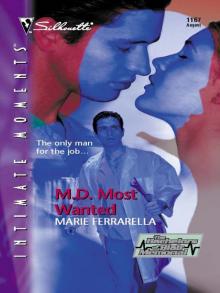 M.D. Most Wanted
M.D. Most Wanted Cavanaugh In Plain Sight (Cavanaugh Justice Book 42)
Cavanaugh In Plain Sight (Cavanaugh Justice Book 42) The Law and Ginny Marlow
The Law and Ginny Marlow Bridesmaid for Hire
Bridesmaid for Hire A Match for the Doctor
A Match for the Doctor The Sheriff’s Christmas Surprise
The Sheriff’s Christmas Surprise Colton's Secret Service
Colton's Secret Service A WEDDING FOR CHRISTMAS
A WEDDING FOR CHRISTMAS A Cavanaugh Christmas
A Cavanaugh Christmas Cavanaugh Fortune
Cavanaugh Fortune The 39-Year-Old Virgin
The 39-Year-Old Virgin Coming To A Crossroads (Matchmaking Mamas Book 24)
Coming To A Crossroads (Matchmaking Mamas Book 24) Cavanaugh's Missing Person
Cavanaugh's Missing Person Cavanaugh on Call
Cavanaugh on Call The M.D.'s Surprise Family
The M.D.'s Surprise Family Angus's Lost Lady
Angus's Lost Lady Her Red-Carpet Romance
Her Red-Carpet Romance Choices (A Woman's Life)
Choices (A Woman's Life) Prescription for Romance
Prescription for Romance A Perfectly Imperfect Match (Matchmaking Mamas)
A Perfectly Imperfect Match (Matchmaking Mamas)![[Kate's Boys 04] - Travis's Appeal Read online](http://i1.bookreadfree.com/i/03/21/kates_boys_04_-_traviss_appeal_preview.jpg) [Kate's Boys 04] - Travis's Appeal
[Kate's Boys 04] - Travis's Appeal Secret Agent Affair
Secret Agent Affair The Cowboy's Lesson in Love
The Cowboy's Lesson in Love Colton Copycat Killer
Colton Copycat Killer A Small Fortune
A Small Fortune Starting from Scratch
Starting from Scratch Her Forever Cowboy
Her Forever Cowboy Colton Showdown
Colton Showdown Crime and Passion
Crime and Passion The Heart of a Ruler
The Heart of a Ruler This Heart for Hire
This Heart for Hire A Forever Kind of Hero
A Forever Kind of Hero Special Agent's Perfect Cover
Special Agent's Perfect Cover The Baby Beneath the Mistletoe
The Baby Beneath the Mistletoe A Maverick and a Half
A Maverick and a Half The Doctor's Guardian
The Doctor's Guardian Cavanaugh Undercover
Cavanaugh Undercover Hero for Hire
Hero for Hire Fortune's Heirs: Reunion
Fortune's Heirs: Reunion How to Seduce a Cavanaugh
How to Seduce a Cavanaugh The Heiress’s 2-Week Affair
The Heiress’s 2-Week Affair Twice a Hero, Always Her Man
Twice a Hero, Always Her Man My Spy
My Spy An Engagement for Two
An Engagement for Two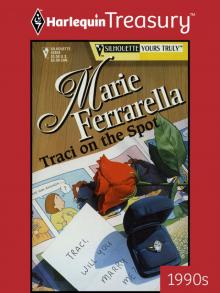 Traci On The Spot
Traci On The Spot Carrying His Secret
Carrying His Secret In Broad Daylight
In Broad Daylight Cavanaugh Cold Case
Cavanaugh Cold Case In Graywolf’s Hands
In Graywolf’s Hands The Baby Mission
The Baby Mission Real Vintage Maverick
Real Vintage Maverick Twins on the Doorstep
Twins on the Doorstep Cowboys Are For Loving
Cowboys Are For Loving Heart of a Hero
Heart of a Hero The Cowboy's Christmas Surprise
The Cowboy's Christmas Surprise Cavanaugh’s Woman
Cavanaugh’s Woman Sundays Are for Murder
Sundays Are for Murder Mission: Cavanaugh Baby
Mission: Cavanaugh Baby Cavanaugh Strong
Cavanaugh Strong Wish Upon a Matchmaker
Wish Upon a Matchmaker Dangerous Games
Dangerous Games What the Single Dad Wants...
What the Single Dad Wants... Rough Around the Edges
Rough Around the Edges Cavanaugh Judgment
Cavanaugh Judgment Cavanaugh Watch
Cavanaugh Watch Cavanaugh's Secret Delivery
Cavanaugh's Secret Delivery The Pregnant Colton Bride
The Pregnant Colton Bride Let's Get Mommy Married
Let's Get Mommy Married Searching for Cate
Searching for Cate A Forever Christmas
A Forever Christmas Dangerous Disguise
Dangerous Disguise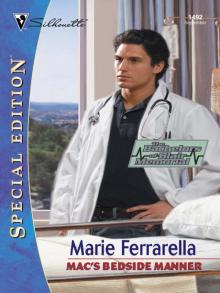 Mac’s Bedside Manner
Mac’s Bedside Manner Cavanaugh Pride
Cavanaugh Pride The Fortune Most Likely To...
The Fortune Most Likely To... Internal Affair
Internal Affair A Second Chance for the Single Dad
A Second Chance for the Single Dad The Cavanaugh Code
The Cavanaugh Code Sapphire and Shadow (A Woman's Life)
Sapphire and Shadow (A Woman's Life) Her Lawman on Call
Her Lawman on Call A Dad At Last
A Dad At Last Her Right-Hand Cowboy (Forever, Tx Series Book 21)
Her Right-Hand Cowboy (Forever, Tx Series Book 21) Cavanaugh Heat
Cavanaugh Heat![[Ladera by the Sea 01] - A Wedding for Christmas Read online](http://i1.bookreadfree.com/i1/03/27/ladera_by_the_sea_01_-_a_wedding_for_christmas_preview.jpg) [Ladera by the Sea 01] - A Wedding for Christmas
[Ladera by the Sea 01] - A Wedding for Christmas Lassoing the Deputy
Lassoing the Deputy Serena Mckee's Back In Town
Serena Mckee's Back In Town A Baby on the Ranch: A Baby on the RanchRamona and the Renegade
A Baby on the Ranch: A Baby on the RanchRamona and the Renegade One Plus One Makes Marriage
One Plus One Makes Marriage Protecting His Witness
Protecting His Witness Cavanaugh Standoff
Cavanaugh Standoff The Baby Came C.O.D.
The Baby Came C.O.D. The Setup
The Setup Texas Rose
Texas Rose Three Marie Ferrarella Romances Box Set One
Three Marie Ferrarella Romances Box Set One The Lawman's Romance Lesson
The Lawman's Romance Lesson Desperately Seeking Twin...
Desperately Seeking Twin... Once a Father
Once a Father![[The Sons of Lily Moreau 02] - Taming the Playboy Read online](http://i1.bookreadfree.com/i/03/25/the_sons_of_lily_moreau_02_-_taming_the_playboy_preview.jpg) [The Sons of Lily Moreau 02] - Taming the Playboy
[The Sons of Lily Moreau 02] - Taming the Playboy Lily and the Lawman
Lily and the Lawman Cavanaugh's Surrender
Cavanaugh's Surrender The Cowboy and the Lady
The Cowboy and the Lady Innkeeper's Daughter
Innkeeper's Daughter A Bachelor and a Baby
A Bachelor and a Baby![[The Sons of Lily Moreau 03] - Capturing the Millionaire Read online](http://i1.bookreadfree.com/i1/03/31/the_sons_of_lily_moreau_03_-_capturing_the_millionaire_preview.jpg) [The Sons of Lily Moreau 03] - Capturing the Millionaire
[The Sons of Lily Moreau 03] - Capturing the Millionaire Because a Husband Is Forever
Because a Husband Is Forever Diamond in the Rough
Diamond in the Rough The Doctor's Forever Family
The Doctor's Forever Family A Lawman for Christmas
A Lawman for Christmas Cavanaugh Rules: Cavanaugh RulesCavanaugh Reunion
Cavanaugh Rules: Cavanaugh RulesCavanaugh Reunion Baby Times Two
Baby Times Two![[The Sons of Lily Moreau 01] - Remodeling the Bachelor Read online](http://i1.bookreadfree.com/i1/04/02/the_sons_of_lily_moreau_01_-_remodeling_the_bachelor_preview.jpg) [The Sons of Lily Moreau 01] - Remodeling the Bachelor
[The Sons of Lily Moreau 01] - Remodeling the Bachelor The Colton Ransom
The Colton Ransom Mendoza's Secret Fortune
Mendoza's Secret Fortune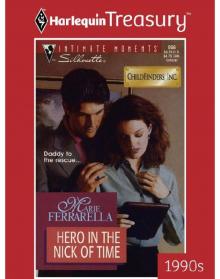 Hero in the Nick of Time
Hero in the Nick of Time![[Kate's Boys 03] - Mistletoe and Miracles Read online](http://i1.bookreadfree.com/i1/04/02/kates_boys_03_-_mistletoe_and_miracles_preview.jpg) [Kate's Boys 03] - Mistletoe and Miracles
[Kate's Boys 03] - Mistletoe and Miracles The Man Who Would Be Daddy
The Man Who Would Be Daddy Fortune's Second-Chance Cowboy
Fortune's Second-Chance Cowboy Coming Home for Christmas
Coming Home for Christmas Her Special Charm
Her Special Charm The Baby Wore a Badge
The Baby Wore a Badge Perfect Wyoming Complete Collection: Special Agent's Perfect Cover ; Rancher's Perfect Baby Rescue ; A Daughter's Perfect Secret ; Lawman's Perfect Surrender ; The Perfect Outsider ; Mercenary's Perfect Mission
Perfect Wyoming Complete Collection: Special Agent's Perfect Cover ; Rancher's Perfect Baby Rescue ; A Daughter's Perfect Secret ; Lawman's Perfect Surrender ; The Perfect Outsider ; Mercenary's Perfect Mission Montana Sheriff
Montana Sheriff Fiona And The Sexy Stranger
Fiona And The Sexy Stranger Military Man
Military Man Dating for Two (Matchmaking Mamas)
Dating for Two (Matchmaking Mamas) Cavanaugh Encounter
Cavanaugh Encounter In His Protective Custody
In His Protective Custody A Small Town Thanksgiving
A Small Town Thanksgiving Wanted: Husband, Will Train
Wanted: Husband, Will Train Suddenly...Marriage!
Suddenly...Marriage! Plain Jane and the Playboy
Plain Jane and the Playboy Private Justice
Private Justice The Strong Silent Type
The Strong Silent Type Christmas Cowboy Duet
Christmas Cowboy Duet Flash and Fire
Flash and Fire Colton by Marriage
Colton by Marriage Fortune's Valentine Bride
Fortune's Valentine Bride Mr. Hall Takes a Bride
Mr. Hall Takes a Bride Her Good Fortune
Her Good Fortune The Disenchanted Duke
The Disenchanted Duke Beauty and the Baby
Beauty and the Baby Cavanaugh Vanguard
Cavanaugh Vanguard In Bed with the Badge
In Bed with the Badge My Phony Valentine
My Phony Valentine The Rancher and the Baby
The Rancher and the Baby Immovable Objects
Immovable Objects Cavanaugh Reunion
Cavanaugh Reunion Wife in the Mail
Wife in the Mail A Hero in Her Eyes
A Hero in Her Eyes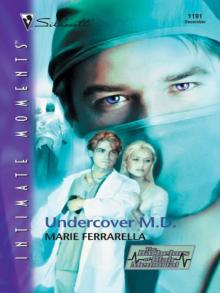 Undercover M.D.
Undercover M.D. Colton Undercover
Colton Undercover Found: His Perfect Wife
Found: His Perfect Wife Dr. Forget-Me-Not (Matchmaking Mamas)
Dr. Forget-Me-Not (Matchmaking Mamas) Loving the Right Brother
Loving the Right Brother Holiday in a Stetson: The Sheriff Who Found ChristmasA Rancho Diablo Christmas
Holiday in a Stetson: The Sheriff Who Found ChristmasA Rancho Diablo Christmas Colton Baby Rescue
Colton Baby Rescue Baby's First Christmas
Baby's First Christmas LASSOED BY FORTUNE
LASSOED BY FORTUNE The M.D. Meets His Match
The M.D. Meets His Match A Baby for Christmas
A Baby for Christmas His Forever Valentine
His Forever Valentine The Inheritance
The Inheritance The Woman Who Wasn't There
The Woman Who Wasn't There![[Kate's Boys 05] - A Lawman for Christmas Read online](http://i1.bookreadfree.com/i2/04/09/kates_boys_05_-_a_lawman_for_christmas_preview.jpg) [Kate's Boys 05] - A Lawman for Christmas
[Kate's Boys 05] - A Lawman for Christmas Husbands and Other Strangers
Husbands and Other Strangers A Match for Morgan
A Match for Morgan The Doctor's Guardian & Tempted By His Target
The Doctor's Guardian & Tempted By His Target The Offer She Couldn't Refuse
The Offer She Couldn't Refuse The 7 Lb., 2 Oz. Valentine
The 7 Lb., 2 Oz. Valentine Fixed Up with Mr. Right?
Fixed Up with Mr. Right? Husband: Some Assembly Required
Husband: Some Assembly Required Adding Up to Family
Adding Up to Family Cavanaugh or Death
Cavanaugh or Death Unwrapping the Playboy
Unwrapping the Playboy Becoming a Cavanaugh
Becoming a Cavanaugh Racing Against Time
Racing Against Time Christmastime Courtship
Christmastime Courtship A Billionaire and a Baby
A Billionaire and a Baby Ten Years Later...
Ten Years Later... Cavanaugh on Duty
Cavanaugh on Duty Cavanaugh Hero
Cavanaugh Hero Finding Happily-Ever-After
Finding Happily-Ever-After The Prodigal M.D. Returns
The Prodigal M.D. Returns Mendoza's Secret Fortune (The Fortunes of Texas: Cowboy Country)
Mendoza's Secret Fortune (The Fortunes of Texas: Cowboy Country) Once Upon a Matchmaker
Once Upon a Matchmaker Diamond in the Ruff (Matchmaking Mamas Book 13)
Diamond in the Ruff (Matchmaking Mamas Book 13) Fortune's Just Desserts
Fortune's Just Desserts![[Kate's Boys 02] - The Bride With No Name Read online](http://i1.bookreadfree.com/i2/04/10/kates_boys_02_-_the_bride_with_no_name_preview.jpg) [Kate's Boys 02] - The Bride With No Name
[Kate's Boys 02] - The Bride With No Name The Agent's Secret Baby
The Agent's Secret Baby Doctoring the Single Dad
Doctoring the Single Dad Stand-In Mom
Stand-In Mom Diamonds and Deceptions
Diamonds and Deceptions The Bride Wore Blue Jeans
The Bride Wore Blue Jeans The Amnesiac Bride
The Amnesiac Bride Cavanaugh's Bodyguard
Cavanaugh's Bodyguard Brooding Angel
Brooding Angel The Once and Future Father
The Once and Future Father Cavanaugh in the Rough
Cavanaugh in the Rough Mother in Training
Mother in Training She’s Having a Baby
She’s Having a Baby Never Too Late For Love
Never Too Late For Love Callaghan's Way
Callaghan's Way Happy New Year--Baby!
Happy New Year--Baby! Diagnosis: Danger
Diagnosis: Danger Your Baby Or Mine?
Your Baby Or Mine? The Maverick's Return
The Maverick's Return Do You Take This Child?
Do You Take This Child? The Women in Joe Sullivan's Life
The Women in Joe Sullivan's Life The Second Time Around
The Second Time Around A Hero for All Seasons
A Hero for All Seasons